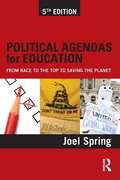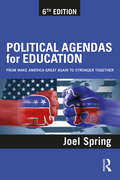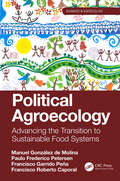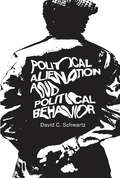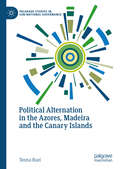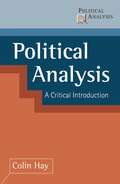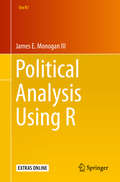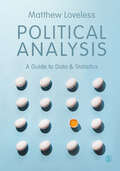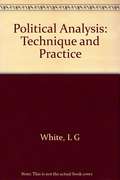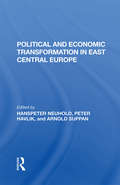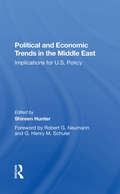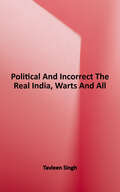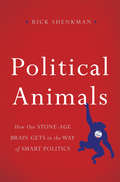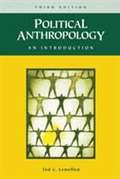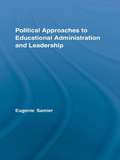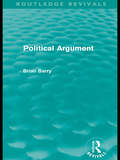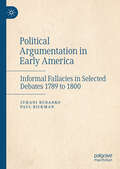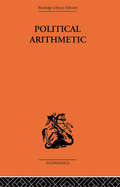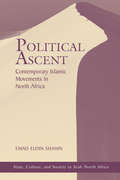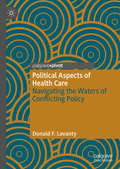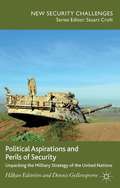- Table View
- List View
Political Agendas for Education
by Joel SpringThe Fifth Edition of Joel Spring's ongoing documentation and analysis of political agendas for education reflects the major political issues in education since 2008. This edition focuses on the education sections of the 2012 Republican, Democratic, Green, and Libertarian Party platforms. Taking a fresh look at the social and political forces, educational research, and ideologies shaping the educational agendas of these political parties and a comparative approach, the book stimulates reflection and discussion. New coverage in the Fifth Edition includes: * The political coup called Race to the Top* Common Core State Standards and national testing based on the Standards* Explosion of online instruction* Debates about teacher evaluations and merit pay* Growing for-profit education industry* New agenda for American Education: Constitutional amendment; long life and happiness; environmental education Political Agendas for Education is essential reading for courses dealing with the politics of education, foundations of education, educational leadership, and curriculum studies, and for educational scholars, professionals, policymakers, and all those concerned with the politics of education in the U.S. and its consequences for schools and society.
Political Agendas for Education: From Make America Great Again to Stronger Together
by Joel SpringFollowing the epic, contentious 2016 presidential election, Joel Spring’s ongoing documentation and analysis of political agendas for education reflect the major political issues since 2012. Here he examines the 2016 education planks of the Republican, Democratic, Libertarian, and Green Parties, using their official platforms and other statements, speeches given by each candidate, and media reports and publications. Each party’s position is linked to previous political movements in education. Spring offers an alternative agenda for American schools, including a proposed education amendment to the U.S. Constitution and replacing human capital agendas with goals emphasizing education for a long life and happiness. Taking a fresh look at the social and political forces, educational research, and ideologies shaping their educational agendas and a comparative approach, the book stimulates reflection and discussion. Updates and changes in the Sixth Edition: Betsy DeVos’s education agenda supporting vouchers, free market competition and for-profit schools and its relationship to the education section of the 2016 Republican platform The important role religion and culture played in the evolution of Republican education policies after the school prayer and Bible decisions of the 1960s The influence of human capital economics on Democratic education proposals How No Child Left Behind and Democratic President Barack Obama opened doors to the growth of the for-profit education industry and investment bankers The 2016 Democratic positions on the cost of higher education and student loan debts The Democratic left as represented by the 2016 campaign of Democrat Bernie Sanders and his influence on the presidential candidate Hillary Clinton and the Democratic Party platform The education proposals of the Green and Libertarian parties
Political Agroecology: Advancing the Transition to Sustainable Food Systems (Advances in Agroecology)
by Manuel González de Molina Paulo Frederico Petersen Francisco Garrido Peña Francisco Roberto CaporalPolitical Agroecology is the first book to offer a systematic and articulated reflection on Political Agroecology from the Agroecological perspective. It defines the disciplinary field responsible for designing and producing actions, institutions and regulations aimed at achieving agrarian sustainability. In short, it aims to build a political theory that makes the scaling-up of agroecological experiences possible, turning them into the foundation of a new and alternative food regime. The book proposes theoretical, practical and epistemological foundations of a new theoretical and practical field of work for agroecologists: Political Agroecology. It establishes a framework for a common agroecological strategy, covering the different levels of collective action and the different instruments with which it can be developed. This will be essential reading for agroecologists, environmentalists, farming and food communities, and an ideal textbook for advanced agroecology courses in universities. Key features: Offers a unique state of the art on this fundamental new topic: Political Agroecology Presents a complete introduction to the political and institutional aspects of Agroecology, covering the whole food system Offers an important tool for searching agrarian sustainability Provides a broad epistemological, theoretical and methodological focus, exploring the connection between the different levels and scales involved in agroecological theory and practice
Political Aid and Arab Activism
by Sheila CarapicoWhat does it mean to promote 'transitions to democracy' in the Middle East? How have North American, European and multilateral projects advanced human rights, authoritarian retrenchment or Western domination? This book examines transnational programs in Egypt, Jordan, Morocco, Yemen, Lebanon, Tunisia, Algeria, the exceptional cases of Palestine and Iraq, and the Arab region at large during two tumultuous decades. To understand the controversial and contradictory effects of political aid, Sheila Carapico analyzes discursive and professional practices in four key subfields: the rule of law, electoral design and monitoring, women's political empowerment and civil society. From the institutional arrangements for extraordinary undertakings such as Saddam Hussein's trial or Palestinian elections to routine templates for national women's machineries or NGO networks, her research explores the paradoxes and jurisdictional disputes confronted by Arab activists for justice, representation and 'non-governmental' agency.
Political Alienation and Political Behavior
by David C. SchwartzWhy do people adopt attitudes of political alienation--attitudes of estrangement from, or lack of identification with, the political system? Why do some politically alienated people react to their alienation by engaging in revolutionary behavior, while others similarly alienated--become reformers or ritualists, and still others simply drop out of political activity?In Political Alienation and Political Behavior, David C. Schwartz attempts to answer these questions, challenging accepted theories of social status and economic difficulties and developing a completely new, three variable psychological theories to explain alienation. Based on observations of threat from value conflict, perceived personal inefficacy, and perceived systemic inefficacy, the theory includes a process model for predicting political behavior.The book is organized into a definition and discussion of the concept of political alienation, including reviews and critiques of relevant scholarly and popular literature; a theoretical explanation of the causes and consequences of alienation; presentation of data; research reports testing the author's explanation of political alienation; tests of a process model explaining the consequences of alienation; and a summary of the major findings of the research, indicating some of the directions that future research might profitably take.Fascinating reading for social scientists, this well-written book will be important to teachers and students concerned with U.S. politics and more generally with the relationship of economic, social, and psychological forces manifested in political behavior.
Political Allegiance After European Integration
by Jonathan WhiteHow should political community be seen in the context of European integration? This book combines a theoretical treatment of political allegiance with a study of ordinary citizens, examining how taxi-drivers in Britain, Germany and the Czech Republic talk politics and situate themselves relative to political institutions and other citizens.
Political Alternation in the Azores, Madeira and the Canary Islands (Palgrave Studies in Sub-National Governance)
by Teresa Ruel“In this innovative study, Dr Ruel explores why political alternation—a bedrock of democratic functioning—has been largely absent in three under-studied regions in Portugal and Spain. Focusing on Madeira, the Azores and the Canary Islands, this book explains how party competition, intra-party democracy and regional economic performance have contributed to political party stasis since the return of democracy in the mid-1970s.” —Paul M. Heywood, Sir Francis Hill Professor of European Politics seconded 0.5 FTE to Global Integrity, Washington DC (2018-21), Faculty of Social Science, University of Nottingham, UK This book is about political alternation. It’s about parties and politicians. It’s about power and resources employed to secure longevity in power over time at Azores, Madeira and the Canary Islands. This book explores the phenomenon of political alternation through an in-depth contextual understanding of the path of regional historical legacies at democratization and decentralization processes started in the 1970s; the institutional architectures and the scope of regional authority endowed in those regions; the specific dynamics of regional politics; and the constellation of political parties and actors and the regional elections results, as well as contextual factors that might explain why some political parties have better performances than other at regional elections. Throughout comparative lessons Ruel seeks to highlight the range of factors that affect regional electoral dynamics and outcomes and to develop a comprehensive understanding of the drivers of long-standing incumbency (Azores and Canary Islands) or the absence of political alternation (Madeira) within regional democracies.
Political Analysis
by Colin Hay"Political Analysis" provides an accessible introduction to the analysis of political structures, institutions, ideas and behaviours and, above all, to the political processes through which they are constantly made and remade. ; Following an innovative introduction to the main approaches and concepts in political analysis, the text focuses thematically on the key issues which currently concern and divide political analysts, including the boundaries of the political the question of structure, agency and power the dynamics of political change the relative significance of ideas and material factors and the challenge posed by postmodernism which the author argues the discipline can strengthen itself by addressing without allowing it to become a recipe for paralysis.
Political Analysis Using R
by James E. MonoganThis book provides a narrative of how R can be useful in the analysis of public administration, public policy, and political science data specifically, in addition to the social sciences more broadly. It can serve as a textbook and reference manual for students and independent researchers who wish to use R for the first time or broaden their skill set with the program. While the book uses data drawn from political science, public administration, and policy analyses, it is written so that students and researchers in other fields should find it accessible and useful as well. By the end of the first seven chapters, an entry-level user should be well acquainted with how to use R as a traditional econometric software program. The remaining four chapters will begin to introduce the user to advanced techniques that R offers but many other programs do not make available such as how to use contributed libraries or write programs in R. The book details how to perform nearly every task routinely associated with statistical modeling: descriptive statistics, basic inferences, estimating common models, and conducting regression diagnostics. For the intermediate or advanced reader, the book aims to open up the wide array of sophisticated methods options that R makes freely available. It illustrates how user-created libraries can be installed and used in real data analysis, focusing on a handful of libraries that have been particularly prominent in political science. The last two chapters illustrate how the user can conduct linear algebra in R and create simple programs. A key point in these chapters will be that such actions are substantially easier in R than in many other programs, so advanced techniques are more accessible in R, which will appeal to scholars and policy researchers who already conduct extensive data analysis. Additionally, the book should draw the attention of students and teachers of quantitative methods in the political disciplines.
Political Analysis: A Guide to Data and Statistics
by Matthew LovelessWhy let other people explain the world to you? From news reporting on elections or unfolding political crises to everyday advertising, you are confronted with statistics. Rather than being swayed by bad arguments and questionable correlations, this book introduces you to the most common and contemporary statistical methods so that you can better understand the world. It′s not about mindless number crunching or flashy techniques but about knowing when to use statistics as the best means to analyse a problem. Whether you want to answer: "Who is most likely to turn out and vote at the next election?" or "What accounts for some political conflicts escalating to war?" you’ll explore what can and can’t be done with statistics, and how to select the most appropriate statistical techniques and correctly interpret the results. Perhaps you simply want to understand enough to pass your statistics class and move on. Maybe you want to build your knowledge so that you are not excluded from research and debate. Or it could be the first step towards more advanced study. Whatever your goal, this book guides you through the journey, empowering you to confidently interact with statistics to make you a more formidable student, employee, and democratic citizen.
Political Analysis: A Guide to Data and Statistics
by Matthew LovelessWhy let other people explain the world to you? From news reporting on elections or unfolding political crises to everyday advertising, you are confronted with statistics. Rather than being swayed by bad arguments and questionable correlations, this book introduces you to the most common and contemporary statistical methods so that you can better understand the world. It′s not about mindless number crunching or flashy techniques but about knowing when to use statistics as the best means to analyse a problem. Whether you want to answer: "Who is most likely to turn out and vote at the next election?" or "What accounts for some political conflicts escalating to war?" you’ll explore what can and can’t be done with statistics, and how to select the most appropriate statistical techniques and correctly interpret the results. Perhaps you simply want to understand enough to pass your statistics class and move on. Maybe you want to build your knowledge so that you are not excluded from research and debate. Or it could be the first step towards more advanced study. Whatever your goal, this book guides you through the journey, empowering you to confidently interact with statistics to make you a more formidable student, employee, and democratic citizen.
Political Analysis: Technique And Practice
by Louise G. WhiteThis text gives students the skills necessary for analyzing important political issues logically and systematically. Louise White guides students through the entire research design process step-by-step, from formulating sound questions and devising strategies for answering them to analyzing and presenting the results. Exercises throughout let students apply and practice these skills using examples based on real world data and current political events.
Political And Economic Transformation In East Central Europe
by Peter Havlik Hanspeter Neuhold Arnold SuppanThis is an examination of the progress that Croatia, the Czech Republic, Hungary, Poland, Slovakia and Slovenia have made in the process of transformation since the collapse of the Soviet bloc. Looking at issues such as democratization, the transition to a market economy and the new orientations in foreign policy, this book provides a report of th
Political And Economic Trends In The Middle East: Implications For U.S. Policy
by Nancy Eddy Shireen Hunter Heidi ShinnThis book explores the rapid changes in the economics and politics of the Middle East, which profoundly influence U.S. policy and interests in the region. The contributors examine elements in the economic picture, including falling oil prices and the uncertainty surrounding OPEC; the concomitant drop in oil revenues and its effect on the spending p
Political And Incorrect: The Real India, Warts And All
by Tavleen SinghMany Prime ministers and governments later, India too has changed, in some ways beyond belief. This work keeps abreast of those changes.
Political Animals: How Our Stone-age Brain Gets In The Way Of Smart Politics
by Rick ShenkmanCan a football game affect the outcome of an election? What about shark attacks? Or a drought? In a rational world the answer, of course, would be no. But as bestselling historian Rick Shenkman shows in Political Animals, our world is anything but rational. This isn’t because we aren’t smart. Instead, modern cues are setting off ancient, instinctive responses that worked to keep us safe in the Stone Age but lead us astray today. Pop culture tells us we can trust our instincts. But science is demonstrating that when it comes to politics, our Stone Age brains can malfunction and misfire. Fortunately, we can learn to override our instincts and ensure that they work in our favor. Drawing on science, politics, and history, Shenkman explores the hidden reasons behind our political choices and uncovers the invisible forces that are truly responsible for victory or defeat at the ballot box.
Political Anthropology: An Introduction
by Ted C. LewellenIn the foreword to the first edition, renowned anthropologist Victor Turner wrote that this book was a succinct and lucid account of the sporadic growth of political anthropology over the past four decades . . . the introduction we have all been waiting for. Unique in its field, this book offers a comprehensive overview of political anthropology, including its history, its major research findings, and its theoretical concerns both past and present. The third edition has been significantly updated and expanded, with extensive changes in many chapters, two new chapters, a new Preface that replaces the Introduction of the first two editions, an updated Glossary and Suggested Readings list, and an expanded Bibliography. In a clearly written style, this introduction also provides the background necessary for further study. The new chapters cover such topics as the politics of identity, and the transition from modernism to postmodernism. As with the earlier editions, this third edition of what has become a classic in the discipline still serves as a basic text and structure for a full course.
Political Approaches to Educational Administration and Leadership (Routledge Research in Education)
by Eugénie A. SamierThis collection explores the political philosophy and theory foundations for educational administration and leadership as they influence our understanding, analysis and practice in the field. The first section, "Political Philosophy: The Foundations," discusses the work of such writers as Machiavelli, Kant and Hegel, Hayek, Habermas, and Bourdieu as their theories apply to the educational context. The second section, "Political Analysis: The Critique," examines various types of political analyses, such as the politics of the policy process, minority politics, civil society, micro-politics, community politics, and cosmopolitan theory. The last section, "Current Political Controversies: The Practice," addresses current topical issues of a political nature, including the serving of the state economic agenda, the democratisation of educational organisations, the neo-conservative agenda, and globalisation. The broad international perspective from which these topics are covered makes this volume an excellent addition to the fields of educational leadership, organizational studies, and educational administration theory.
Political Argument (Routledge Revivals)
by Brian BarrySince its publication in 1965, Brian Barry's seminal work has occupied an important role in the revival of Anglo-American political philosophy. A number of ideas and terms in it have become part of the standard vocabulary, such as the distinction between "ideal-regarding" and "want-regarding" principles and the division of principles into aggregative and distributive. The book provided the first precise analysis of the concept of political values having trade-off relations and its analysis of the notion of the public interest has also been significant.
Political Argumentation in Early America: Informal Fallacies in Selected Debates 1789 to 1800
by Juhani Rudanko Paul RickmanThis book investigates the language used by protagonists in four major political debates in the early history of the United States. The first of these concerns the controversy in the first United States House of Representatives in the summer of 1789 on whether a proposal for a bill of rights should be considered in an expeditious fashion or whether the issue should be left till much later. The second is the principal debate on whether a sedition act should be enacted in July 1798, and the third concerns the enactment of the Logan Act of 1799. The fourth investigates the elections for the Legislature of the State of New York in the spring of 1800, which was the key event affecting the outcome of the presidential election of 1800. In each case there was a sharp disagreement between groups of politicians representing different points of view, and each event was significant from the point of view of the political history of the United States. The authors introduce these four debates, as well as the notion of informal fallacy - taken to designate an argument that is unsatisfactory in some way - before analysing deceptive fallacies and demonstrating how fallacy theory can be used as a critical tool in the examination of political argumentation. This book will be of interest to students and scholars of political communication, rhetoric and argumentation, US history and politics, and diachronic linguistics, especially diachronic pragmatics.
Political Arithmetic: A Symposium of Population Studies
by Lancelot HogbenEncompassing the areas of economics, sociology, social biology and genetics, and drawing on studies from the UK and Australia, this volume charts and analyses the factors affecting population growth. Chapters include:* The international decline in fertility* The changing structure of the family* Educational opportunities* Concepts of race.
Political Ascent: Contemporary Islamic Movements In North Africa
by Emad Eldin ShahinIslamic movements in North Africa have historically been distinguished from their counterparts in other parts of the Arab world because they have demonstrated a marked willingness to work within the political system and have at times even been officially recognized and allowed to participate in local and national elections. As a result, Islamic thinkers from the Maghrib have produced important writing about the role of Islam and the state, democracy, and nonviolent change. In this book, Emad Shahin offers a comparative analysis of the Islamic movements in Algeria, Tunisia, and Morocco, exploring their formation and expansion in the late 1960s and the tenets of their ideology for social transformation. }Islamic movements in North Africa have historically been distinguished from their counterparts in other parts of the Arab world because they have demonstrated a marked willingness to work within the political system and have at times even been officially recognized and allowed to participate in local and national elections. As a result, Islamic thinkers from the Maghrib have produced important writing about the role of Islam and the state, democracy, and nonviolent change. In this book, Emad Shahin offers a comparative analysis of the Islamic movements in Algeria, Tunisia, and Morocco, exploring the roots of their development, the nature of their dynamics, and the tenets of their ideology. He argues that the formation and expansion of Islamic movements since the late 1960s has come in response to the marginalization of Islam in state and society and to a perceived failure of imported models of development to resolve socioeconomic problems or to incorporate the Muslim belief system into a workable plan for social transformation. }
Political Aspects of Health Care: Navigating the Waters of Conflicting Policy
by Donald F. LavantyAs a consultant for healthcare associations working on all the healthcare laws from Medicare, the Health Manpower Act, Budget Reconciliation, Clinton healthcare efforts and the Affordable Healthcare Act, Donald Lavanty had a front-row seat from which to witness the politics and policies motivating each action. This volume was written from that experience, which was first documented in the course on the Political Aspects of Healthcare, employing the analogy that these various legislative actions to connect the system are like attempting to build a canal connecting the Amazon and Nile rivers: a long and difficult process. The title examines ongoing efforts to create and maintain a workable solution to the conflicts inherent in the US healthcare system from all angles, conflicts that arise due to the nature of our democratic government in which healthcare policies change based on the position of the voting majority in Congress at the time any action is taken.
Political Aspects of Social Indicators: Implications for Research (Social Science Frontiers #Vol. 4)
by Peter J. HenriotComplementing the focus on the structural and social-psychological aspects of measuring social change, this report establishes a research approach relating social measurement to antecedent and consequent political considerations: political values, policy impact, power consequences, administrative influences, institutionalization, and so forth. This study is directed to any social scientist interested in political phenomena and in the issue of the relationship between social science and public policy.
Political Aspirations and Perils of Security
by Håkan Edström Dennis GyllensporreThis book comprises of a range of case studies of military strategy, based on UN documents, observing and concluding the effectiveness of each individual case. Edstrom and Gyllensporre analyse the UN's military strategy, its consequences and its potential to fulfil political ambitions.
